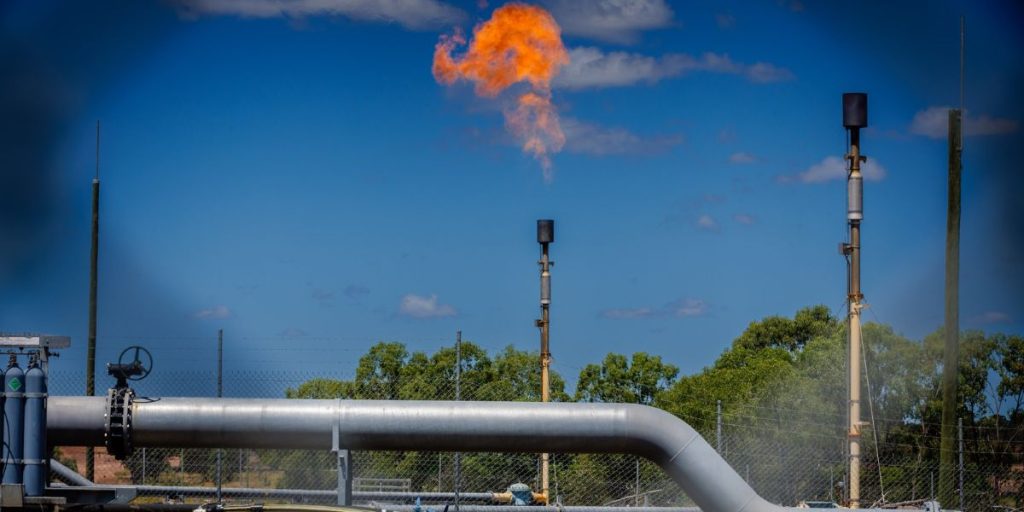The Biden administration introduced a new regulation proposal on Friday that would impose a new tax on the fossil fuel industry, punishing firms that emit more methane than a specified amount.
The proposal, led by the Environmental Protection Agency (EPA), states that it will assist “tackle wasteful methane emissions” from the oil and gas sector by encouraging facilities with the highest emissions levels to reach or exceed higher levels of performance. The proposed laws would establish the so-called Waste Emissions Charge, which would start at $900 per metric ton of wasted emissions in 2024 and rise to $1,200 in 2025, $1,500 in 2026, and $1,500 in 2027.
“Under President Biden’s leadership, the EPA is delivering on a comprehensive strategy to reduce wasteful methane emissions that endanger communities and fuel the climate crisis,” said EPA Administrator Michael Regan in a statement.
“Today’s proposal, when finalized, will support a complementary set of technology standards and historic resources from the Inflation Reduction Act, to incentivize industry innovation and prompt action.”
“We are laser-focused on working collectively with companies, states, and communities to ensure that America leads in deploying technologies and innovations that aid in the development of a clean energy economy,” he said.
Green groups and Democratic congressional leaders immediately hailed the decision, including Senate Environment and Public Works Committee Chairman Tom Carper, D-Del., who said the idea would “slow climate change and protect our one and only planet.”
The Environmental Defense Fund’s president, Fred Krupp, noted that adopting a methane price was a “common sense” approach to reduce emissions across the economy.
For years, environmentalists and Democrats have sought stronger limits on methane, which advocates term a “super pollutant” and is significantly more potent than carbon dioxide. The EPA noted in its announcement on Friday that lowering methane emissions was one of the most critical acts the US could do to “slow the rate of rapidly rising global temperatures.”

However, the EPA’s proposal was met with opposition by the fossil fuel sector, which called it a “punitive tax increase.”
“As the world looks to U.S. energy producers to provide stability in an increasingly unstable world, this punitive tax increase is a serious misstep that undermines America’s energy advantage,” said Dustin Meyer, senior vice president of policy, economics, and regulatory affairs at the American Petroleum Institute.
“While we support smart federal methane regulation, this proposal creates an incoherent, confusing regulatory regime that will only stifle innovation and undermine our ability to meet rising energy demand,” Meyer said in a statement. “We look forward to working with Congress to repeal the IRA’s misguided new tax on American energy.”
The EPA’s steps come just a month after it presented new environmental restrictions aimed at reducing methane emissions during the recent United Nations climate summit in Dubai.
These laws include stringent new criteria requiring the energy industry to reduce methane emissions, mostly through the use of advanced technology such as pollution-control devices and aerial screening, sensor networks, and satellites. It also includes a mandate to avoid routine natural gas flaring, which is the release of gas produced during oil drilling activities that lack catch devices.
The EPA stated that the methane fee announced on Friday is intended to function in combination with the regulations finalized last month.
The EPA stated in its release, “The Waste Emissions Charge will help encourage the oil and gas industry to stay on track to reduce emissions.” “Oil and natural gas operations with methane emissions in excess of the emissions intensity levels established in the Inflation Reduction Act can reduce or eliminate any charge by deploying readily available technologies to reduce harmful and wasteful emissions.”
“This program will help to level the playing field for industry leaders already employing best practices and drive near-term opportunities for more widespread methane reductions while EPA and states work toward full implementation of the Clean Air Act standards,” according to the statement.